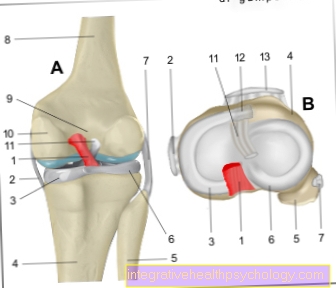Rapid Vitamin D Test - Who Should Do It?
Synonyms
Vitamin D3
25 Hydroxy- (OH) vitamin D = vitamin D storage form
introduction
With the help of the vitamin D rapid test, the vitamin D content in the blood can be determined independently or by a doctor. In this way, an undersupply of vitamin D is revealed. This is very important for two reasons:
- The body's own vitamin D production requires UV radiation on the skin. Due to insufficient exposure to the sun, around every second person living in Germany has a vitamin D deficiency.
- Vitamin D has important functions in our body. It is important for our bone metabolism, our mood, the immune system and others.
Doctors therefore recommend performing the rapid vitamin D test on a regular basis. You can find out more from us.
Also read: Vitamin D - what is it important for?

Who should absolutely do a rapid vitamin D test?
The following groups of people have a special recommendation for performing a vitamin D test:
- People who are not outside often
- People who avoid the sun
- People who work in shifts
- People who are bedridden or overweight
- People with mood swings or a depressed attitude
- People with listlessness and constant fatigue
- People with frequent infections
- People with liver, kidney or intestinal diseases
- People with milk intolerance (lactose intolerance)
However, doctors generally advise all people to regularly check their vitamin D status.
The reason for this is as follows: In order for our body to have a sufficient supply of vitamin D, exposure to the sun on our skin is necessary. The body cannot produce vitamin D without the sun. Therefore, many Germans have low vitamin D values in the winter months. But even the summer is usually not enough to raise the vitamin D level to normal values.
The vitamin D test is therefore a way of discovering a lack of vitamin D and of compensating for it simply by adding vitamin D.
Also read: How do I know if I have a vitamin D deficiency?
Why is vitamin D deficiency dangerous?
Vitamin D has many important functions in our body.
The most important task of vitamin D is the regulation of calcium metabolism. Calcium is built into the bones and strengthens our bones. In the case of prolonged vitamin D deficiency, the body can no longer absorb sufficient calcium. This in turn means that less calcium is built into the bone and the bone loses its strength. Bone atrophy (osteoporosis) and frequent bone fractures occur.
Vitamin D also has positive effects on our immune system, our cardiovascular system and our muscle building. With sufficient vitamin D values, fewer infections and increased motivation can be expected. Vitamin D also has a positive effect on our mood.
Find out more about this topic at: What happens if there is a vitamin D deficiency?
For general information we recommend our website: Vitamin deficiency - this is how you recognize it!
Can I get a rapid vitamin D test without a prescription?
Yes. Vitamin D rapid tests are freely available both in pharmacies and on the Internet. The cost of the vitamin D rapid test is around 30 euros.
When performing the test independently, a needle is pricked on a finger. You should use the needle provided in the package. The blood droplets are then collected in a tube. This is also included in the pack. Finally, the tube is sent to a laboratory. You will receive your vitamin D results online, by telephone or by post within a few days.
How does the vitamin D rapid test work?
The vitamin D level can be checked by any general practitioner. You do not have to prepare for the test; you can usually eat and drink beforehand as usual. However, if you are already taking vitamin D tablets, you should stop taking them 3 to 4 days before the test so that the result is not incorrectly high.
A simple blood sample from the vein is required for the rapid vitamin D test. The blood sample obtained is sent to a laboratory. There the concentration of the storage form of vitamin D - i.e. 25-hydroxyvitamin-D (25-OH-vitamin-D) - is determined. After a few days you will receive your results on the vitamin D level.
Evaluation and standard values of vitamin D.
In order to determine the vitamin D level, the actual vitamin D3 in the blood is not determined, but the storage form 25-hydroxy-vitamin D. In this way it is possible to determine the long-term vitamin D supply in the body.
The evaluation based on the storage form (25-OH-Vitamin-D) is carried out as follows:
- Normal values: 30-60 ng / ml or 75 mmol / l
- Vitamin D deficiency: 20-30 ng / ml or 50-75 mmol / l
- Vitamin D deficiency: <20 ng / ml or <50 mmol / l
- Vitamin D overdose: 90-150 ng / ml or 225-374 mmol / l
- Vitamin D poisoning:> 150 ng / ml or> 374 mmol / l
Find out more about this topic at: Vitamin D - you should know that!
Duration until the test result
Most laboratories determine the vitamin D results after a few days. It can take up to a week to get your vitamin D level results.
Are there any risks with the vitamin D test?
The rapid vitamin D test only requires a standard blood draw from the vein. No risks that can be traced back to the test itself are therefore expected.
How expensive is the vitamin D rapid test?
The cost of a vitamin D test is around 30 euros.
If you carry out the test at your family doctor, the health insurance company will only cover the costs if the doctor suspects a vitamin D deficiency.
In most cases, however, you have to pay for the test yourself.
What are the alternatives?
The vitamin D level can only be measured independently at home by taking a blood sample from the doctor or using the vitamin D rapid test. A blood sample is therefore always required.





























